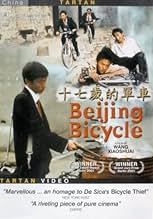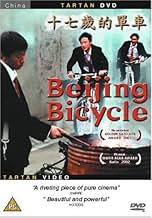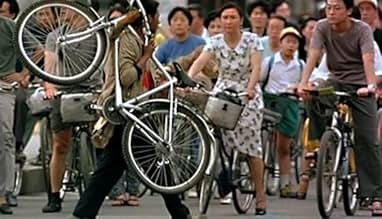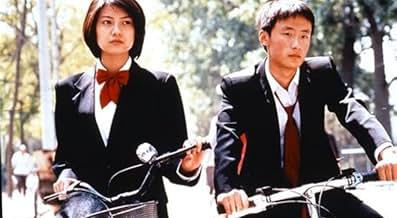IMDb RATING
7.2/10
4.8K
YOUR RATING
A seventeen-year-old country boy working in Beijing as a courier has his bicycle stolen, and finds it with a schoolboy his age.A seventeen-year-old country boy working in Beijing as a courier has his bicycle stolen, and finds it with a schoolboy his age.A seventeen-year-old country boy working in Beijing as a courier has his bicycle stolen, and finds it with a schoolboy his age.
- Awards
- 2 wins & 10 nominations total
Lin Cui
- Guo Liangui
- (as Cui Lin)
Guancheng Liu
- Mantis
- (as Lei Liu)
Featured reviews
"Beijing Bicycle" (Chinese, 2002): This is one of the purest films I've seen all year. Don't believe the blurb written about it: two boys learn sharing through the use of one bicycle. The blurb couldn't be MORE WRONG. This story has one of the smoothest, most linear, singularly focused goals I've experienced in a film along with "The Field", which I rewatched earlier this year. There are no plot twists, no what-ifs, no "oh my god, I had no idea THAT was happening!" moments. "Beijing Bicycle" is a simple, yet symbolic film about a young man who comes to the big city, gets a job as a bicycle messenger, and things quickly go from uncomfortable, to bad, to awful, to worse it seems. "Guei" (the messenger) wasn't raised to recognize the ways of a metropolis, which tries to chew him up piece by piece. We get to "know" other characters who we believe (along with Guei) ARE who they appear to be. "Beijing Bicycle" has to be the finest expression of what I would expect to be the current set of fears by those in China who see their future as an unknown, with the "replacement model" being the U.S.A.. This story expresses the huge doubts caused by the loss of Mao and the Communist way of life. Even if it WASN'T perfect, they were familiar with it, and many of these "new world" things did not happen THEN. Those who are (literally) "buying" into the free market concepts, are losing their pride, identities, and souls. Watch for the slow, steady transitions of situations and characters. Watch for the symbols of decadence, greed, unhealthy living, improper greed, corruption, and sadness all within a small group of teens.
Browsing through some of the previous comments, it seems many viewers take the movie primarily as an allegory of class clash in Beijing. While the movie does state the contrast with emphasis, it's much more interesting as a story about teens. The title translates literally to "seventeen years' bicycle."
The story is just that. Guo is a young man who earned a bicycle and promptly has it stolen. Through luck and perseverance, he finds it in the possession of Jian, a high school student. Trouble ensues.
I grew up in Taiwan, and I remember kids doing incredibly cruel things to each other. Not so much gunning down classmates but there were plenty of physical and emotional violence. This movie is a powerhouse of insight into the psyche of teenagers. Contemporary Hollywood pumps out teenage movies by the dozen each year, and most simply gloss over the amount of pain and awkwardness adolescence can bring. Beijing Bicycle, on the other hand, can serve as an instructional manual for any high-school bully wannabes on how to reduce the stammering geek next door to a shell of a man.
It's therefore understandable that the movie can be very difficult to watch at moments. Guo suffers humiliation after humiliation, and at times I wondered in frustration what it would take to get him to swing back (the ending provides some answer to that, I think). There is some humor in the movie, and Guo does have the resources to prevail occasionally. If you can stand two main characters respectively passive and oblivious, the story is an incredibly touching one about being young.
The story is just that. Guo is a young man who earned a bicycle and promptly has it stolen. Through luck and perseverance, he finds it in the possession of Jian, a high school student. Trouble ensues.
I grew up in Taiwan, and I remember kids doing incredibly cruel things to each other. Not so much gunning down classmates but there were plenty of physical and emotional violence. This movie is a powerhouse of insight into the psyche of teenagers. Contemporary Hollywood pumps out teenage movies by the dozen each year, and most simply gloss over the amount of pain and awkwardness adolescence can bring. Beijing Bicycle, on the other hand, can serve as an instructional manual for any high-school bully wannabes on how to reduce the stammering geek next door to a shell of a man.
It's therefore understandable that the movie can be very difficult to watch at moments. Guo suffers humiliation after humiliation, and at times I wondered in frustration what it would take to get him to swing back (the ending provides some answer to that, I think). There is some humor in the movie, and Guo does have the resources to prevail occasionally. If you can stand two main characters respectively passive and oblivious, the story is an incredibly touching one about being young.
Beijing Bicycle by Sixth Generation director Wang Xiaoshuai is an unsettling look at modern China in transition that depicts the relationship between two young men of different social status, both yearning for acceptance and stubbornly determined to succeed. Guei (Cui Lin) is an unexpressive working class 17-year old who has come to Beijing to find work, while Jian (Li Bin), is a sophisticated middle-class student, desperate to belong, seeking approval from his biker friends and his beautiful girlfriend Gin (Zhao Yiwel). The film explores the consequences when Guei's bicycle is stolen and ends up in Jian's hands. The bicycle represents an escape for both from the competitive pressures of their lives. For Guei, it is a means of access to a job, an income, and survival. For Jian, it is the pathway to being "cool" and being in the in-group, much like what the flashy sports car represents to young men in Western countries.
As the film opens, a group of boys are being interviewed for a job as a courier. Enticed by the prospect of owning a silver mountain bike, Guei takes the job and begins to save money to buy the bike, given to him as a loan (the bike is his once he has earned 700 yuan, which is about $85). Out of his element in the bewildering city, Guei runs into an awkward situation almost immediately when he makes a delivery in a luxury hotel and is directed to the gym where he is forced to strip for a shower before he can deliver his package. He is then asked to pay for the shower when he leaves but does not have enough money. When his bike is stolen just one day before he can become the owner, Guei's job is threatened.
Xie Jian as Guei's manager is both abrasive and compassionate and offers to take Guei back to work if he can find his bike. In a city where bicycles are still the most common means of transportation, against all odds he sets out to find it. The film is about the bicycle but is also about the city of Beijing. Guei's search for the bicycle takes him into all corners of the city. With an original score by Felix Wang and magnificent cinematography by Jie Liu, the city comes alive with streets littered with traffic juxtaposed with mysterious alleys where old men play board games or do Tai Chi. Wang adds the little touches as well such as two friends sharing a toothbrush and a single spigot of water in an alley serving an entire neighborhood.
Like De Sica's The Bicycle Thief, the stolen bicycle is central to the story, but here it is not about the hunt but about the consequences that follow from its recovery. When the student Jian is found with the bike, both he and Guei assert ownership and the bike is stolen and reclaimed by both boys several times, each time ending in a scuffle with Jian's friends. In a powerful confrontation with his father, Jian, in a rage against his father for reneging on his promise to buy him a bike, finally admits to stealing his father's money to purchase the bike himself at the flea market after it was fenced. The two boys are pitted against each other but mutual need brings them together and allows them to work out a compromise by alternating the days when each can use the bike. Eventually a serious confrontation takes place that escalates into a startling conclusion.
Beijing Bicycle is a deeply human odyssey that, while somewhat repetitive, never loses its rhythm. Though there is little dialogue and the characters communicate mostly with body language, long silences, and facial expressions, the actors perform their roles with astonishing authenticity. Parts of the film are emotionally upsetting, but there is also a sweet innocence at play. Jian acts like a typical adolescent-surly, angry with his parents, shy with girls, audacious and impetuous one minute, and then needy and contrite the next. In one of the concluding scenes, as a group of punks chase two boys through a an older section of Beijing; one says to the other, "What are you doing? This doesn't concern you." The other replies, "I don't know my way out." In today's new China, caught between the traditions of an ancient culture and the new urban reality, young people are having trouble finding their way out.
As the film opens, a group of boys are being interviewed for a job as a courier. Enticed by the prospect of owning a silver mountain bike, Guei takes the job and begins to save money to buy the bike, given to him as a loan (the bike is his once he has earned 700 yuan, which is about $85). Out of his element in the bewildering city, Guei runs into an awkward situation almost immediately when he makes a delivery in a luxury hotel and is directed to the gym where he is forced to strip for a shower before he can deliver his package. He is then asked to pay for the shower when he leaves but does not have enough money. When his bike is stolen just one day before he can become the owner, Guei's job is threatened.
Xie Jian as Guei's manager is both abrasive and compassionate and offers to take Guei back to work if he can find his bike. In a city where bicycles are still the most common means of transportation, against all odds he sets out to find it. The film is about the bicycle but is also about the city of Beijing. Guei's search for the bicycle takes him into all corners of the city. With an original score by Felix Wang and magnificent cinematography by Jie Liu, the city comes alive with streets littered with traffic juxtaposed with mysterious alleys where old men play board games or do Tai Chi. Wang adds the little touches as well such as two friends sharing a toothbrush and a single spigot of water in an alley serving an entire neighborhood.
Like De Sica's The Bicycle Thief, the stolen bicycle is central to the story, but here it is not about the hunt but about the consequences that follow from its recovery. When the student Jian is found with the bike, both he and Guei assert ownership and the bike is stolen and reclaimed by both boys several times, each time ending in a scuffle with Jian's friends. In a powerful confrontation with his father, Jian, in a rage against his father for reneging on his promise to buy him a bike, finally admits to stealing his father's money to purchase the bike himself at the flea market after it was fenced. The two boys are pitted against each other but mutual need brings them together and allows them to work out a compromise by alternating the days when each can use the bike. Eventually a serious confrontation takes place that escalates into a startling conclusion.
Beijing Bicycle is a deeply human odyssey that, while somewhat repetitive, never loses its rhythm. Though there is little dialogue and the characters communicate mostly with body language, long silences, and facial expressions, the actors perform their roles with astonishing authenticity. Parts of the film are emotionally upsetting, but there is also a sweet innocence at play. Jian acts like a typical adolescent-surly, angry with his parents, shy with girls, audacious and impetuous one minute, and then needy and contrite the next. In one of the concluding scenes, as a group of punks chase two boys through a an older section of Beijing; one says to the other, "What are you doing? This doesn't concern you." The other replies, "I don't know my way out." In today's new China, caught between the traditions of an ancient culture and the new urban reality, young people are having trouble finding their way out.
While watching this movie I couldn't help but be reminded of The Bicycle Thief (Ladri di biciclette). This is a story of determination of two young men. One works hard for a bicycle courier and on the day he would have earned the bike, it is stolen. The other steals money from his family and buys a bike so that he can impress a girl. Yes, it's the same bike. Amazingly, Guo is able to find his stolen bike, but that isn't the end of his troubles. I couldn't help but feel for all the crap he has to put up with, especially since all he wanted was to be a hard worker. Yet, like us all, life threw him a curveball and he does everything in his power to deal with the situation. *** (Out of 4)
I don't care what this film may have to say about the class struggle in Beijing-that entire aspect of the film being way too obviously stated for my taste. I was more concerned with my struggle to stay interested in what was happening. Back and forth, back and forth with the damn bicycle. Nobody speaks up when you want them to, and no one asks the question your mind is screaming in any given scene. All the characters behave inexplicably to the point of exasperating the viewer. Now I love a lot of potentially frustrating films (Neighbors, for example), and I'm not one to demand payoff out of hand. I can roll with films and see where they take me. But this one was taking me down aggravation alley. Beijing Bicycle looks good, and the writing is reasonably clever, so on the surface it makes a good 'import'-many will profess to have been deeply moved, but I'm not buying. Skip this one, but for a similar tale with leagues more depth, see Cyclo.
Did you know
- TriviaThe arcade game that Jian and his friends play is "Dance Dance Revolution".
- How long is Beijing Bicycle?Powered by Alexa
Details
- Release date
- Countries of origin
- Official sites
- Language
- Also known as
- Xe Đạp Bắc Kinh
- Filming locations
- Production companies
- See more company credits at IMDbPro
Box office
- Gross US & Canada
- $66,131
- Gross worldwide
- $215,854
- Runtime1 hour 53 minutes
- Sound mix
- Aspect ratio
- 1.85 : 1
Contribute to this page
Suggest an edit or add missing content

























